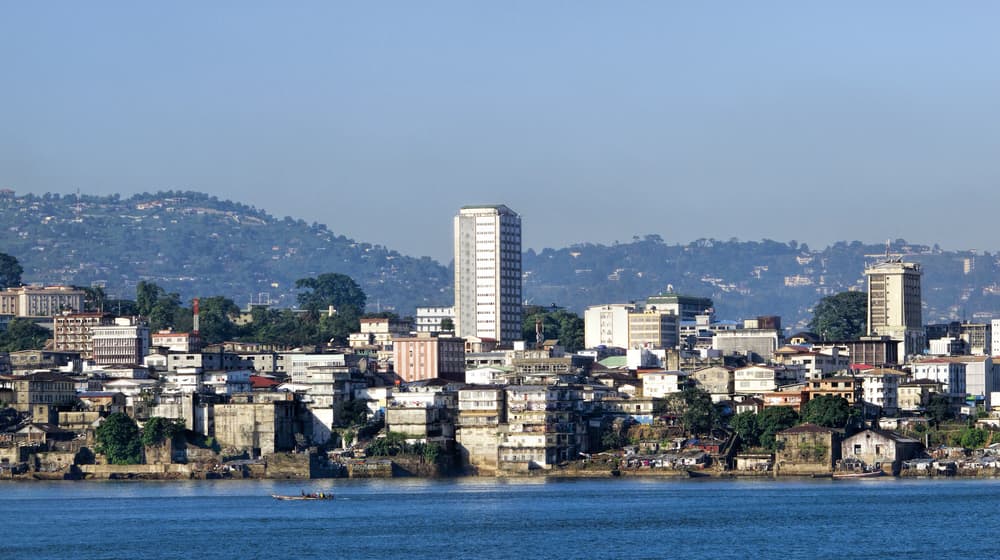
Sierra Leone Adventures: part II

People that work in the mining and exploration business typically work in shifts. I worked a five weeks on, two weeks off shift. I would fly into Sierra Leone, spend five weeks there working and then fly home for two weeks. This was a great set-up for me financially because I was getting paid approximately 20% more in absolute terms as compared to my friend in Barclays Capital investment banking division in London, and I had no expenses. In Sierra Leone I was transported, fed and slept either in a tent or in the compound—in London I lived at home and while I was in town I was not only cash rich, I was also famous like a pirate: on the party scene with an African-grown beard, full of tales about my time in the jungle looking for gold.
Ladies love pirates.
During my time there, I went between the compound and a jungle camp site 500 km east of Freetown. The drive from Freetown to the campsite was mostly through small, dirt roads that traversed villages throughout the jungle. Toyota Land Cruisers are built to traverse extreme terrain. Trucks often became stuck in large potholes in dirt roads; our land cruisers were usually equipped with steel rope with hooks to pull other vehicles out of the mud.
The campsite was in the earlier stages of development, which meant we all lived in small tents with cots and worked out of a larger, central tent that had a large iron mast to catch radio signals. We showered out of buckets and usually ate in the open air, unless it was raining, in which case we would eat in the large central tent.
I was charged with managing a USD50,000/month drilling program in which it was incumbent upon the company and its employees to move the drill rig from point A to point B (once the machine was in position and reassembled, a contractor actually operated it). Rigs weigh hundreds of kilograms, need to be taken apart and moved piece by piece; the jungle has no roads or trails—these must be created from scratch with machetes while workers avoid monkeys, cobras and other dangerous animals while carrying the rig on their backs.
Fresh out of college, young, wide-eyed, naïve, 23 years old—I was managing a team of 50 grown men, most of whom were north of 30, married (children), tasked with carrying heavy weight across long distances, up, down hills under a scorching Sierra Leone sun. I had never received any management training or education; in my lack of experience, I tried friendliness and empathy, and quickly learned that these methods were effective, but insufficient. Without respect I didn’t wield authority therefore employees were friendly but unproductive, so I picked up pieces of the rig and carried them alongside my men.
When they saw that my expectations of them were based on an embodied understanding of their work, suddenly, I was on their level: rather than from on high, my demands originated in humility—the place from which I naturally became their leader. It was through this experience that I began learning about myself and discovering my ability to build relationships in a way that served everyone involved: the employees, the company and me.
These were my first lessons in leadership.
Sierra Leone Adventures: part II
People that work in the mining and exploration business typically work in shifts. I worked a five weeks on, two weeks off shift. I would fly into Sierra Leone, spend five weeks there working and then fly home for two weeks. This was a great set-up for me financially because I was getting paid approximately 20% more in absolute terms as compared to my friend in Barclays Capital investment banking division in London, and I had no expenses. In Sierra Leone I was transported, fed and slept either in a tent or in the compound—in London I lived at home and while I was in town I was not only cash rich, I was also famous like a pirate: on the party scene with an African-grown beard, full of tales about my time in the jungle looking for gold.
Ladies love pirates.
During my time there, I went between the compound and a jungle camp site 500 km east of Freetown. The drive from Freetown to the campsite was mostly through small, dirt roads that traversed villages throughout the jungle. Toyota Land Cruisers are built to traverse extreme terrain. Trucks often became stuck in large potholes in dirt roads; our land cruisers were usually equipped with steel rope with hooks to pull other vehicles out of the mud.
The campsite was in the earlier stages of development, which meant we all lived in small tents with cots and worked out of a larger, central tent that had a large iron mast to catch radio signals. We showered out of buckets and usually ate in the open air, unless it was raining, in which case we would eat in the large central tent.
I was charged with managing a USD50,000/month drilling program in which it was incumbent upon the company and its employees to move the drill rig from point A to point B (once the machine was in position and reassembled, a contractor actually operated it). Rigs weigh hundreds of kilograms, need to be taken apart and moved piece by piece; the jungle has no roads or trails—these must be created from scratch with machetes while workers avoid monkeys, cobras and other dangerous animals while carrying the rig on their backs.
Fresh out of college, young, wide-eyed, naïve, 23 years old—I was managing a team of 50 grown men, most of whom were north of 30, married (children), tasked with carrying heavy weight across long distances, up, down hills under a scorching Sierra Leone sun. I had never received any management training or education; in my lack of experience, I tried friendliness and empathy, and quickly learned that these methods were effective, but insufficient. Without respect I didn’t wield authority therefore employees were friendly but unproductive, so I picked up pieces of the rig and carried them alongside my men.
When they saw that my expectations of them were based on an embodied understanding of their work, suddenly, I was on their level: rather than from on high, my demands originated in humility—the place from which I naturally became their leader. It was through this experience that I began learning about myself and discovering my ability to build relationships in a way that served everyone involved: the employees, the company and me.
These were my first lessons in leadership.




